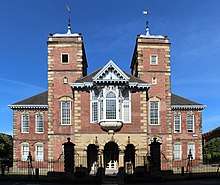Dame Allan's School
Dame Allan's Schools is a collection of Independent schools in Fenham, in the west end of Newcastle upon Tyne, England. It comprises a coeducational junior school, single-sex senior schools and a coeducational sixth form. Founded in 1705 as a charity, the original schools are two of the oldest schools in the city.
| Dame Allan's Schools | |
|---|---|
 | |
| Address | |
Fowberry Crescent , NE4 9YJ United Kingdom | |
| Information | |
| Type | Independent day school |
| Religious affiliation(s) | Church of England |
| Established | 1705 |
| Founder | Dame Eleanor Allan |
| Local authority | Newcastle upon Tyne |
| Principal | Dr John Hind |
| Head of Junior School | Geoff Laidler |
| Gender | Coeducational; single-sex (Senior School) |
| Age | 3 to 18 |
| Enrolment | approx. 920 |
| Colour(s) | |
| Former pupils | Old Allanians |
| Website | http://www.dameallans.co.uk/ |
History


They were founded by Dame Eleanor Allan, the daughter of a local goldsmith and the widow of a tobacco merchant, to provide a proper education for "40 poor boys and 20 poor girls of the parishes of St Nicholas and St John". The schools were endowed with land at Wallsend, to the east of Newcastle. The original school seems likely to have been near St Nicholas's Church, and certainly was by 1778.[1] It moved to Manor Chare near All Saints' Church in 1786, to Carliol Square in 1821, to Rosemary Lane off Pudding Chare in 1861, and to Hanover Square in 1875.[1] The school then moved to College Street in Newcastle in 1883 and remained there until 1935 when it re-located to the present site in Fenham.[1]
Until 1988 the schools operated as separate boys' and girls' schools with a joint governing body. The governors then took the decision to appoint a principal with overall responsibility for the management of the two schools. At the same time, they created a joint mixed sixth form and reintroduced a mixed junior school. The plural, "schools", refers to the fact that Dame Allan's operates in a diamond format. In effect, Dame Allan's consists of 4 different schools: the co-educational Junior school for nursery to Year 6 are located in a separate building in Spital Tongues; the single sex boys' and girls' schools for years 7 to 11; and the co-educational sixth form (years 12 to 13).[2]
Facilities
A number of new classrooms were built between 2004 and 2005 to replace older facilities, with some intended specifically for the sixth form centre.[3] The Sixth Form Centre was opened by Queen Elizabeth II during an official visit on 14 October 2005 and was named the Queen's Building.[4]
September 2012 saw the opening of the new nursery and junior school in Spital Tongues.[5]
2015 saw Dame Allan's chosen as the recipient of a £250,000 grant to help fund a £500,000 project. The grant was given by the Reece Foundation which promotes the improvement of education in engineering, technology and related subjects. The new facility will build on the Schools' existing master class programme.[6]
Academics
All schools are private, and potential candidates must pass written exams and an interview. The fees are currently (December 2018) around £4,412 per term in the Main Schools and £4,312 per term in the Junior Department. These fees include books and external examination entry fees, but do not include meals (£3.72 per day). Scholarships of up to 50% are available on the basis of academic merit, and bursaries of up to 100% are available on the basis of academic merit and financial need.[2]
Being a private school, Dame Allan's does not strictly adhere to the National Curriculum. It does enter all its students in public examinations such as GCSEs and A-levels, so the subjects taught are closely tied into their national counterparts. All students must study English, mathematics, and the sciences to GCSE level, and it is strongly recommended that at least one foreign language be studied to this level. Sixth form students have a much wider range of study, with no mandatory subjects and the introduction of many new subjects in year 12, including A-levels in politics, psychology, sports, business and theatre studies. Dame Allan's is an Anglican school.[7]
In 2005 the school recorded its best ever set of exam results, including a handful of Top 5 results in several subjects, notably GCSE languages.[8] Furthermore, two pupils were awarded 6 grade As at A-level. The school consistently performs to an extremely high standard in public examinations, with the girls' school often slightly outscoring the boys' school at GCSE level.[9] The school has not yet been inspected by OFSTED[10] but received a positive report from the independent schools Inspectorate in 2000.[11]
The 2000 inspection summarised the schools as "a civilised and civilising community ...[which provides] a well-rounded education for pupils from the age of 8 to 18"[11] and the 2006 report states "Dame Allan's are good schools with several great strengths and no significant weaknesses. The schools succeed very well in their key aims of providing a broad education for their pupils, where academic success is greatly valued but so is the moral, social and spiritual development of pupils."[12]
Notable former pupils
Former pupils are known as Old Allanians.
- The Right Reverend John Crook (born 1940), former Bishop of Moray, Ross and Caithness[13]
- Dame Myra Curtis (1886–1971), Principal of Newnham College, Cambridge[14]
- Margaret Dale (1922–2010), dancer and television producer[15]
- Professor Elizabeth Fallaize (1950–2009), Pro-Vice-Chancellor (Education), University of Oxford[16]
- Marian Foster (born 1948), broadcaster[17]
- Edward Hinds FRS (born 1949), Professor of Physics[18]
- Ian La Frenais (born 1936), writer[19]
- David Leon (born 1980), actor[20]
- Sir David Lumsden (born 1928), Choirmaster, organist and harpsichordist; former Principal of the Royal Academy of Music[21]
- Philip Nicholson (born 1973), Northumberland cricketer[22]
- Sebastian Payne (born 1989), journalist[23]
- Peter Pilkington (1933–2011), Conservative Peer and former Chairman of the Broadcasting Complaints Commission[24]
- Varada Sethu (born 1992), actress[25]
- Keith Wrightson (born 1948), Randolph W. Townsend Professor of History, Yale University, since 2004.[26]
References
- "History of Dame Allan schools commemorated". The Journal. 2 November 2010. Retrieved 10 March 2018.
- "Boys". Dame Allan's School. Archived from the original on 9 May 2006. Retrieved 17 August 2009.
- "Dame Allan's School website". Archived from the original on 9 May 2006. Retrieved 4 April 2006.
- "Crowning glory of our 300th birthday". The Chronicle. 12 October 2005. Retrieved 10 March 2018.
- Weatherall, Nicola (18 September 2012). "Dame Allan's School pupils get a blessing from the Bishop of Newcastle". The Journal. Retrieved 8 January 2017.
- "Reece Foundation". Dame Allan's School. Archived from the original on 23 September 2015. Retrieved 20 August 2015.
- "Curriculum from dameallans.co.uk". Archived from the original on 29 September 2011. Retrieved 4 April 2006.
- "Top marks at Dame Allan's" (Press release). Dame Allan's School. Archived from the original on 28 September 2007. Retrieved 5 April 2006.
- "Newcastle-upon-Tyne league tables, 2005". BBC News. Retrieved 2 January 2010.
- "OFSTED reports for Dame Allan's". Archived from the original on 3 March 2006. Retrieved 4 April 2006.
- "Independent Schools Inspectorate report, 2000". Independent Schools Inspectorate. Archived from the original on 12 October 2006. Retrieved 4 April 2006.
- Independent Schools Inspectorate report, 2006
- Who's Who 2008: London, A & C Black, 2008 ISBN 978-0-7136-8555-8
- Mary Alvey Thomas (2004), "Curtis, Dame Myra", Oxford Dictionary of National Biography, Oxford University Press, doi:10.1093/ref:odnb/40538
- Who Was Who in the Theatre:1912-1976 vol.2 D-H p.586; from editions originally published annually by John Parker..Retrieved July 2, 2015
- "Elizabeth Fallaize obituary". The Guardian. 3 January 2010. Retrieved 10 March 2018.
- "School record that will never be broken". The Journal. 15 August 2005. Retrieved 10 March 2018.
- "The Northern Echo: Prestigious awards for school's old boys". The Northern Echo. 4 November 2007. Archived from the original on 24 May 2012. Retrieved 25 January 2009.
- Richard Webster; Dick Clement; Ian la Frenais (2001). Porridge The Inside Story. Headline Book Publishing. ISBN 0-7472-3294-6.
- "Vera actor David Leon teams up with Boardwalk Empire's Stephen Graham for debut feature". The Chronicle. 23 February 2016. Retrieved 10 March 2018.
- "Lumsden, Sir David (James)", Who's Who, online edition, Oxford University Press 2016. Retrieved 26 November 2017 (subscription required)
- "Profile of Philip Nicholson". Cricket Archive. Retrieved 11 April 2012.
- "Seb Payne's schooldays". The Spectator. 14 March 2015. Retrieved 20 October 2019.
- Obituary The Daily Telegraph, 15 February 2011
- "Geordie actress Aimee Kelly in line for film award". chroniclelive.co.uk. 2013. Archived from the original on 16 October 2018.
- "WRIGHTSON, Prof. Keith Edwin". Who's Who. ukwhoswho.com. 2019 (online ed.). A & C Black, an imprint of Bloomsbury Publishing plc. (subscription or UK public library membership required) (subscription required)
External links
- The findings of the most recent inspection of the Boys' Schools by the Independent Schools Inspectorate in 2006
- The findings of the most recent inspection of the Girls' Schools by the Independent Schools Inspectorate in 2006
- Official school website
- A brief review of schools in the area mentioning Dame Allan's